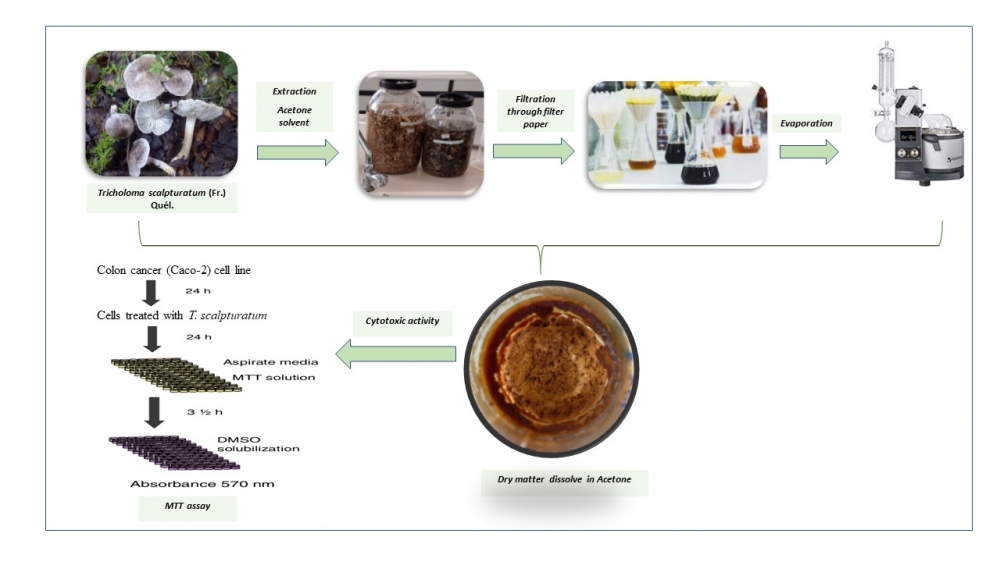JOURNAL 3129
Records of Agricultural and Food Chemistry
Year: 2024 Issue: 3 Special Issue: Abstracts 3rd. TCS, International Food Chemistry Congress February 29-March 03,2024 Antalya Türkiye
p.79 - 70
Viewed 1423 times.
GRAPHICAL ABSTRACT

ABSTRACT
Numerous investigations have reported that mushrooms possess anticancer activities. For several decades, mushrooms have been approved as food additives against cancer particularly in Japan and China [1]. Since cancer incidence increases yearly, researchers have increased searching for effective anticancer compounds from mushrooms. This research explores the cytotoxic potential and apoptosis mechanisms of the acetone extract of edible Tricholoma scalpturatum (Fr.) Quél. mushroom against colorectal cancer (Caco-2) cell lines [2,3]. The MTT 3-(4,5-dimethylthiazol-2-yl)-2,5-diphenyltetrazolium bromide) assay was employed to assess the cytotoxic activity to find the effective concentration (EC50) value. The apoptotic effect was evaluated through three methodologies: image cytometry using the Annexin V-FITC/PI apoptosis detection kit, Western Blot analysis targeting apoptosis-associated proteins, and Real-Time PCR (qPCR) to determine mRNA levels of apoptosis-related genes. The extract from T. scalpturatum exhibited a dose-dependent suppression of Caco-2 cell lines proliferation, with an EC50 value of 46.86±2.01 µg/mL. The image cytometry results showed that Tricholoma scalpturatum acetone extract stimulated 6.75-fold apoptotic cells compared to the control group. According to the real-time PCR analysis, the acetone extract increased the expression level of the BAX gene 2.71-fold while it decreased the expression of the BCL-2 gene 1.90-fold (p<0.05) compared to the control group. Moreover, the extract also notably increased mRNA expressions of Caspase 3, 8, and 9 (5.46, 4.46, and 3.01-fold, respectively). Results were normalized using GAPDH (glyceraldehyde 3-phosphate dehydrogenase). In addition, the anti-apoptotic BCL-2 protein level was significantly decreased. However, BAX, Caspase 3, 8, and 9 protein levels were significantly induced as a result of extract treatment. Apoptosis involves both intrinsic and extrinsic pathways regulated by various genes. Since the acetone extract appears to induce apoptosis by affecting both pathways, isolation of bioactive compounds should be performed as further investigations.
KEYWORDS- Tricholoma scalpturatum
- apoptosis
- cytotoxicity
- colon cancer (Caco-2) cell lines